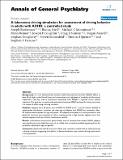| dc.contributor.author | Biederman, Joseph | |
| dc.contributor.author | Fried, Ronna | |
| dc.contributor.author | Monuteaux, Michael C. | |
| dc.contributor.author | Reimer, Bryan | |
| dc.contributor.author | Coughlin, Joseph F. | |
| dc.contributor.author | Surman, Craig B. | |
| dc.contributor.author | Aleardi, Megan | |
| dc.contributor.author | Dougherty, Meghan | |
| dc.contributor.author | Schoenfeld, Steven | |
| dc.contributor.author | Spencer, Thomas J. | |
| dc.contributor.author | Faraone, Stephen V. | |
| dc.date.accessioned | 2010-09-27T17:06:57Z | |
| dc.date.available | 2010-09-27T17:06:57Z | |
| dc.date.issued | 2007-01 | |
| dc.date.submitted | 2006-08 | |
| dc.identifier.issn | 1744-859X | |
| dc.identifier.uri | http://hdl.handle.net/1721.1/58717 | |
| dc.description.abstract | Background: It is now estimated that attention deficit-hyperactivity disorder (ADHD) afflicts at least 4% of adults in the United States and is associated with high levels of morbidity and functional impairment. One key area of dysfunction associated with ADHD is impaired motor vehicle operation. Our goal was to examine the association between ADHD and specific driving outcomes in a sample of adults using a driving simulator. Methods: Subjects were 20 adults with full DSM-IV ADHD and 21 controls without ADHD of equal gender distribution. However, the mean age of subjects with ADHD was somewhat older. All analyses were adjusted for age and gender. All subjects participated in a driving simulation that lasted for one hour and consisted of a short training period, a high stimulus segment and a low stimulus segment with two distinct monotonous periods. Results: In the second monotonous period within the low stimulus environment, ADHD subjects were significantly more likely than controls to collide with an obstacle suddenly appearing from the periphery, adjusting for age and gender. Conclusion: Adults with ADHD were more likely than controls to collide with an obstacle during a driving simulation suggesting that deficits in directed attention may underlie driving impairments in this population. | en_US |
| dc.description.sponsorship | United States. Dept. of Transportation | en_US |
| dc.description.sponsorship | Ortho-McNeil (Firm). Consumer & Specialty Pharmaceuticals | en_US |
| dc.description.sponsorship | Janssen Pharmaceutical Ltd. | en_US |
| dc.description.sponsorship | New England University Transportation Center | en_US |
| dc.publisher | BioMed Central Ltd | en_US |
| dc.relation.isversionof | http://dx.doi.org/10.1186/1744-859X-6-4 | en_US |
| dc.rights | Creative Commons Attribution | en_US |
| dc.rights.uri | http://creativecommons.org/licenses/by/2.0 | en_US |
| dc.source | BioMed Central Ltd | en_US |
| dc.title | A laboratory driving simulation for assessment of driving behavior in adults with ADHD: a controlled study | en_US |
| dc.type | Article | en_US |
| dc.identifier.citation | Annals of General Psychiatry. 2007 Jan 30;6(1):4 | en_US |
| dc.contributor.department | Massachusetts Institute of Technology. Center for Transportation & Logistics | en_US |
| dc.contributor.mitauthor | Coughlin, Joseph F. | |
| dc.contributor.mitauthor | Reimer, Bryan | |
| dc.relation.journal | Annals of General Psychiatry | en_US |
| dc.eprint.version | Final published version | en_US |
| dc.identifier.pmid | 17263888 | |
| dc.type.uri | http://purl.org/eprint/type/JournalArticle | en_US |
| eprint.status | http://purl.org/eprint/status/PeerReviewed | en_US |
| dc.date.updated | 2010-09-03T16:23:09Z | |
| dc.language.rfc3066 | en | |
| dc.rights.holder | Biederman et al.; licensee BioMed Central Ltd. | |
| dspace.orderedauthors | Biederman, Joseph; Fried, Ronna; Monuteaux, Michael C; Reimer, Bryan; Coughlin, Joseph F; Surman, Craig B; Aleardi, Megan; Dougherty, Meghan; Schoenfeld, Steven; Spencer, Thomas J; Faraone, Stephen V | en |
| mit.license | PUBLISHER_CC | en_US |
| mit.metadata.status | Complete | |
